North Melbourne coach Alastair Clarkson reveals how he reached decision to join club
New North Melbourne coach Alastair Clarkson has urged Ben Rutten to keep following his football dream, despite the heartache of losing his job at Essendon. Read what he had to say.
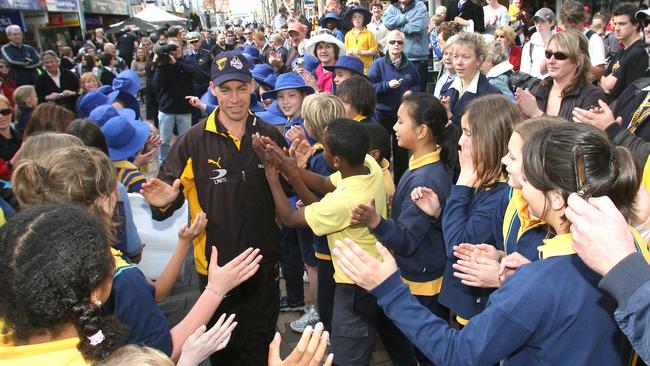
AFL
Don't miss out on the headlines from AFL. Followed categories will be added to My News.
Alastair Clarkson wasn’t just screening calls from the media during the “circus” that unfolded around him in recent weeks as he wrestled with the coaching options on offer.
He even dodged calls from some former North Melbourne teammates eager to talk him into choosing the Kangaroos over Greater Western Sydney and Essendon.
As hard as it was to block the calls, he knew he had to resist the temptation to answer.
The four-time premiership coach wanted to ensure he had the clarity to make a rational decision on his future — without any of his old mates tugging at his heart strings.
“Strangely enough, that emotional attachment didn’t become a part of the decision making until we had made the decision,” Clarkson told the Herald Sun.
Watch every match prior to the AFL grand final Live & Ad-Break Free In-Play on Kayo. New to Kayo? Start your free trial now >
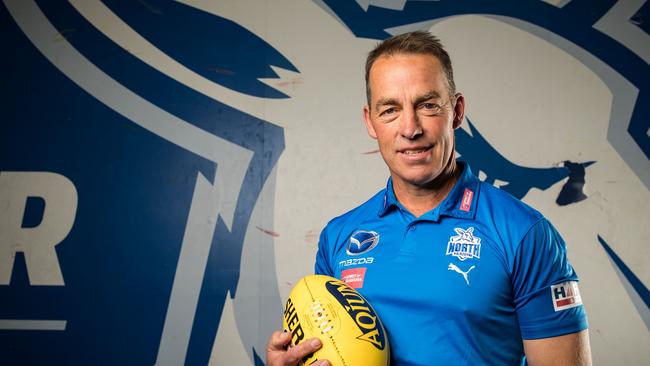
“When it came time to say, ‘OK, we have a decision to make’, it was purely on what we could do with this football club to return it to challenge for silverware again.
“I deliberately, to the point of almost rudeness, didn’t want to stay connected (during the decision-making process) when Arch (Glenn Archer) was ringing, when Mark Brayshaw was ringing … Anthony Stevens, Craig Sholl, Darren Crocker, Darren Steele and Peter German.
“All these great North Melbourne people, who I had spent an enormous amount of time with on the journey (were calling). I didn’t want them to sway me into making an emotional decision.
“I didn’t want this to be only an emotional link with North Melbourne and to make the wrong decision because of emotion.”
For a variety of reasons, Clarkson chose North Melbourne as his home for at least the next five seasons.
But while he is looking to the future expectantly, knowing he is ready to “roll the sleeves up” and get to work, he can’t help but think back to how the club shaped his life.
“After the decision was made, to actually link back with some of those guys, I was so pleased,” he said. “That’s why I became so emotional last Friday (at the press conference).”
YOUNG ROO
Clarkson was a talented young footballer from Kaniva, in western Victoria, before he joined North Melbourne in the mid-1980s.
He was, by his own admissions, “mischievous”, yet shaped by both his upbringing from his hardworking parents, and a family tragedy that forever changed their lives.
His brother, Andrew, was killed in a single-car accident in 1984.
As Clarkson told the Herald Sun this week: “My brother lost his life … alcohol was involved in his accident and fortunately no one else was with him when he crashed.
“Mum used to always say that as horrific as this was, she was so glad we were the only ones who were traumatised by this and that we hadn’t created trauma for another family.
“As tough as it was to deal with, his passing should have been a real lesson for many people, but especially for his younger brother.
“I was mischievous, not in terms of breaking the law, but about being a bit silly and doing what all young kids do.
“It is sometimes a treacherous path all kids need to navigate from the age of 16 to 18, or even from 18 to 21. You need really good people in your life to steer you in a good direction.”
Clarkson’s arrival at Arden Street coincided with meeting three people who would shape his direction in a personal and professional sense.
Almost 40 years on, he said: “I was at a point in my life where I was really fortunate that three people came into my life within 12 months.
“That was my future wife (Caryn), John Kennedy Sr and Denis Pagan. You cannot help but be significantly influenced by those people.”
Caryn has been his life partner ever since as well as the mother of their three children — daughters Steph and Georgia and son Matthew.
Kennedy, the Kangaroos’ senior coach at the time, and Pagan, the Kangaroos’ under-19s coach and future senior coach, helped provide Clarkson with the discipline that shaped his pathway.
He played 93 games with North Melbourne and 41 with Melbourne before embarking on a coaching career that took in 17 seasons and four premierships at Hawthorn.
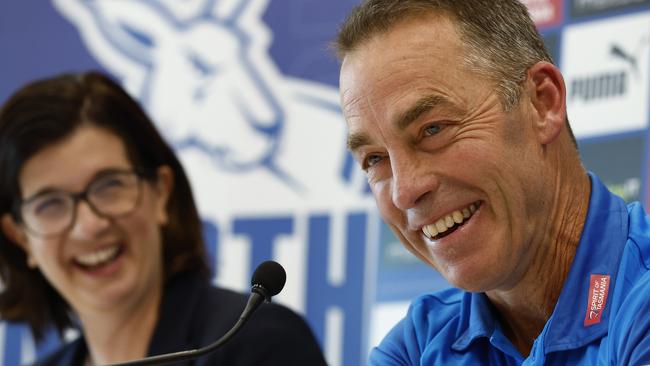
SENSE OF COMMUNITY
One of the things that attracted Clarkson to North Melbourne in discussions with president Sonja Hood was the club’s connection to the community at Arden St.
“They have made some really strong steps in the Arden St precinct, with the link to the community and multiculturalism,” Clarkson said.
“What I love about North Melbourne is the diversity and the inclusion, which excites me. Sonja has been the real driver of the whole program.
“It is simple to say that the North Melbourne Football Club needs to stay in North Melbourne because the roots of the club are in Arden St.
“But we’ve got a purpose that is not just football. A lot of us get caught up in the football side of things and we need to address that. It is a key part of my role at the club.
“But we’ve also got to understand that in this society nowadays where everything seems to be focusing on individuals, we are forgetting a little bit about family, a little bit about community and a little bit about team.
“I found the moons aligned really strongly with my values and with the club’s values. It had a lot to do with community and bringing together people from all walks of life, from all different cultures and countries and galvanising them.”
Clarkson’s father was “a 10 pound Pom” who searched for a better life in Australia in the early 1950s.
“His first decade was the Great Depression, his second decade was the Second World War,” he said. “So many people from England or Europe went to either America or Australia, those two promised lands … to start a life for themselves.”
Clarkson’s parents — his dad was a builder and his mother a primary and kindergarten teacher — taught him the importance of education, which led him on a coaching pathway.
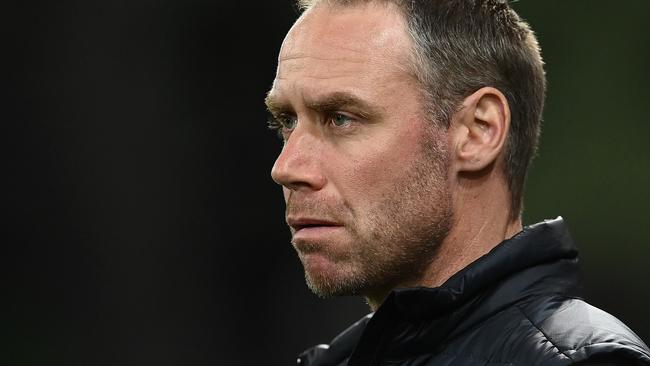
WHY HE FEELS FOR RUTTEN
Clarkson stressed it is never one single person who spearheads any club’s fightback, and that’s why he was so uncomfortable with all the talk centred on his future.
He felt awkward, especially for then Essendon coach Ben Rutten, who was left in the dark when the Bombers made a late pitch to Clarkson.
“There is a real discomfort in our game when any one person becomes the central figure,” he said.
“All coaches preach roles, sacrifices, community and team, so I don’t think there would be one coach in the competition who wouldn’t feel comfortable having the sole focus on them.”
Clarkson had “no control” over what Essendon did, but it didn’t stop a sense of unease when Rutten’s tenure at Tullamarine came to an end.
“When there is conjecture and fallout for other people who are implicated in the whole process, like Truck, it is really unfortunate,” he said.
“There is all this ‘the (AFL) Coaches’ Association should have been better, the club should have been better, the industry should have been better or the AFL should have done something’. But what can you really do?
“It is an enormously difficult predicament. There are no easy solutions. We can jump up and down about it. But we have been jumping up and down and trying to avoid it for 20, 30 or 50 years, all the way back to North Smith (in 1965).
“By and large, despite the hardship and adversity, this industry does look after its people.”
Two days after Clarkson was publicly announced as North Melbourne’s new coach, Rutten was sacked as Essendon coach.
Clarkson urged Rutten to keep following his football dream, despite the heartache of losing his job at Essendon.
“I would hope that in overcoming this hiccup in ‘Truck’s’ journey, that he gets back on the bike and gets involved again,” he said.
“He is a good football person. He has got something to offer the game, as long as he looks at this as one small part of his football journey.
“He has had a great playing career and up until the last two weeks, he has had a really good time in coaching. Yes, he has hit a speed hump, but he has served the game well and the game has served him well.
“It’s the same as I experienced at Hawthorn last year. It (his departure) was unsavoury, but I hope I was able to give good service to the club, and I know the Hawthorn Football Club has been great in terms of the journey we’ve been able to have.”
DID HE STAY TOO LONG AT THE HAWKS?
Clarkson made way for new Hawthorn coach Sam Mitchell at the end of last season after coming to the realisation the coaching handover devised by president Jeff Kennett wasn’t going to work.
Asked if he had stayed at the club too long after a remarkable 17 seasons, Clarkson said it was always hard to leave when selling a club’s vision.
“When you are selling a vision to people, whether they are draft kids or staff members, it is hard,” he said. “I did have in my mind, and shared it with others, that it was more likely than otherwise that the baton change was going to happen at the end of 2022.”
“When ‘Bucks’ (Nathan Buckley) lost his position at Collingwood, and that meant ‘Mitch’ was a candidate, the club needed to ask themselves, ‘Do we want Sam Mitchell to be in consideration for coaching Hawthorn?, because if you do, you need to address it now.
“I was the one who went to the board with that suggestion. Things got a bit messy from there in terms of where it went from there, whether I would finish up in ’21 or ’22.
“I had to ask what the next challenge was going to be, whether it was inside footy or outside footy, would it be inside coaching or outside coaching?
“I was ready for the next challenge, so was my family, and now we get this great opportunity.”
FIGHTBACK
Clarkson doesn’t officially start in the coaching role until November 1, but he has wasted no time in getting busy.
There have already been some departures from the football department and his long-time friend Todd Viney — who was also a premiership assistant coach at Hawthorn with him in 2008 — has been appointed general manager of football.
There will be more changes to come.
The club will go to the draft with the current No.1 pick on offer — the first time he has had access to that as a coach — as well as the potential for priority draft access.
The Kangaroos are looking to bring in some experienced players, with two of Clarkson’s former players, St Kilda’s Brad Hill, and Hawthorn’s Liam Shiels tipped as possible recruits.
He famously took Hawthorn to Kokoda just weeks into his first pre-season in late 2004 and would love to do something similar to unite the Kangaroos’ playing group.
But the AFL’s contentious soft cap financial squeeze has made that difficult.
“We could do some enormous things for the game in promoting it overseas or getting to various parts of this country,” he said. “But it is much more difficult now with the soft cap.”
“We would like to do something (special) with the club, but we will wait and see.”
Clarkson isn’t expecting a quick bounce, but he is excited by the blank canvas in front of him.
“Collingwood and Carlton have shown that in the space of 12 months clubs can go from turmoil to really strong seasons,” he said. “Now I am not expecting that we are going to be able to bounce as quickly as that because we are on the bottom of the ladder for a reason.
“We have underperformed in so many areas, so our path might be a little longer. But how exciting is it to journey right from the start.
“Our improvement and our growth as a footy club is going to come from the vast majority of the people who are there now.
“What those people need is some sort of clear vision so that they can see this is the purpose of why they come into the building every day to don the blue and white colours and to galvanise a much greater band of people who follow this club
“We have the privilege to do it day by day on behalf of those 50,000 members we have got and the many more out there who are supporters of this footy club who want us to go back up the ladder.
“That’s a privilege that is not lost on anyone.”
Clarko’s blunt message for AFL’s Tassie doubters
Alastair Clarkson has urged clubs to cast aside parochial interests and look at the big picture, insisting a national AFL competition will never be complete without a Tasmanian team.
As the 18 clubs prepare for a historic vote on the prospect of a 19th AFL franchise, the master coach said a stand-alone Tassie team could thrive in a football and financial sense.
Clarkson acted as an adviser to the Tasmanian AFL Taskforce and Tasmanian Government during his year out of coaching and believes a positive outcome would give the AFL a national boost.
“There is something philosophically and fundamentally wrong when a part of the country that has contributed so much to the history of our game has been neglected when the game has gone national,” Clarkson told News Corp.
“Even if you look at our constitution, they (Tasmania) are a part of our founding states. So if they are a part of that, and we have a national competition, they simply have to be in there.
“They are an AFL heartland down there. Together with South Australia, Western Australia and Victoria, that is where the game has evolved and where the strength of the game has been created in those four states. Yet one of those states isn’t represented at AFL level.”
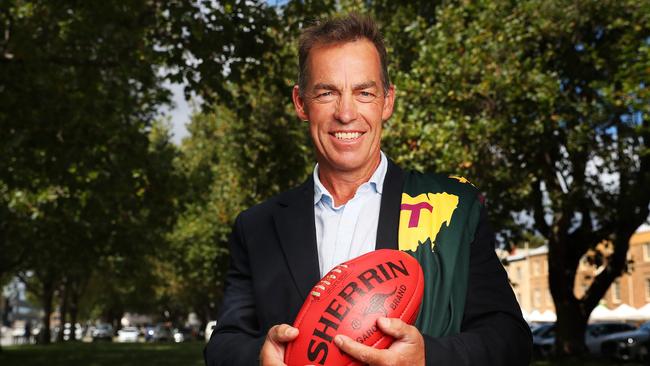
Clarkson said the AFL clubs who expressed doubts about the financial viability of a Tasmanian team had an insular outlook, without considering what an extra club can bring to the table.
“There is not a person in the country who thinks they (Tasmania) shouldn’t be in there,” he said. “The only people (against it) are those who have got a vested interest in trying to protect their own clubs with a view that they are going to drain money out of the game.
“Hey, how about we consider the money they (Tasmania) might create in the game.”
Clarkson cited the negative viewpoint from some clubs about the establishment of the newest franchises in Gold Coast and Greater Western Sydney who joined in 2011 and 2012.
“The narrative around GWS and Gold Coast is actually incorrect,” Clarkson said.
“They say they are draining money from the competition. They are not.
“Having those two teams in, in terms of broadcast money for the game, every club and every person involved in the game has benefited.
“The easy angle is to say that they (the new franchises) are getting paid a much greater dividend than the other clubs. (But) you go and see what is happening to those (established) clubs if those two teams are not in the competition.
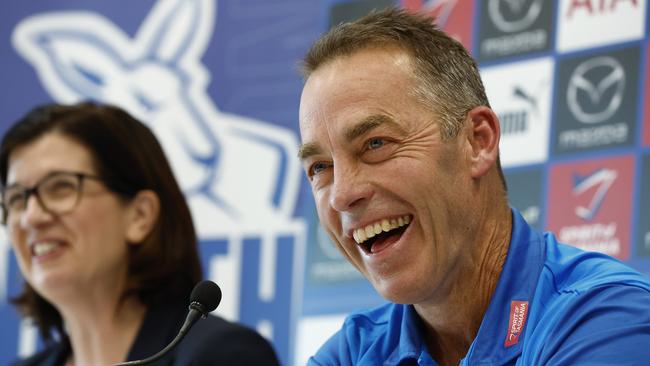
“I am certain that Tassie would be the same.
“That is what they can do for the game in terms of bringing in revenue, what they can do for their own club in terms of a really special and unique model (in Tasmania), and in how they can structure it in terms of who runs and owns the club.”
He stressed that while Macquarie Point in Hobart would be an ideal location for a new state-of-the-art stadium, in terms of a sporting precinct akin to what has been developed in Adelaide and Perth, he felt as if the AFL was too obsessed with the stadium debate.
“I think we are all getting caught up far too much in the stadium,” he said, with Tasmania already having AFL standards venues in Hobart and Launceston.
“Macquarie Point is a magnificent site that could pioneer how venues and precincts could operate in this country.
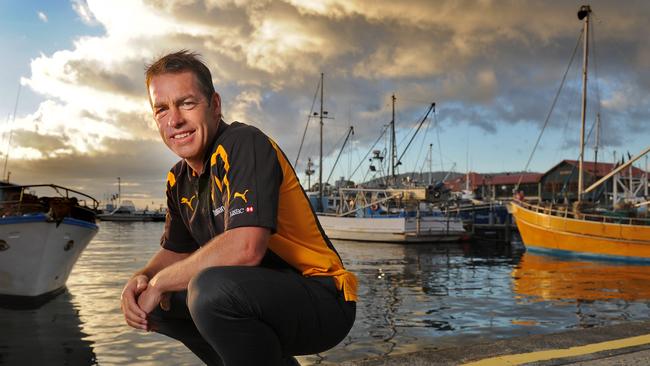
“Whether we look at it in five years’ time and say we can only afford a $300 million stadium or if we actually say no, we are going to build this precinct and we can afford $600 or $700 or $800 million and we could partner up with universities and hospitals and event facilities with a hotel and convention centre, we could do something unbelievably special.”
He said the existing clubs can make a vote for the future of the national competition by rightfully including Tasmania.
“This isn’t about Tasmania,” he said.
“This is for the game and what we can do as an industry for the game.”
More Coverage
Originally published as North Melbourne coach Alastair Clarkson reveals how he reached decision to join club




